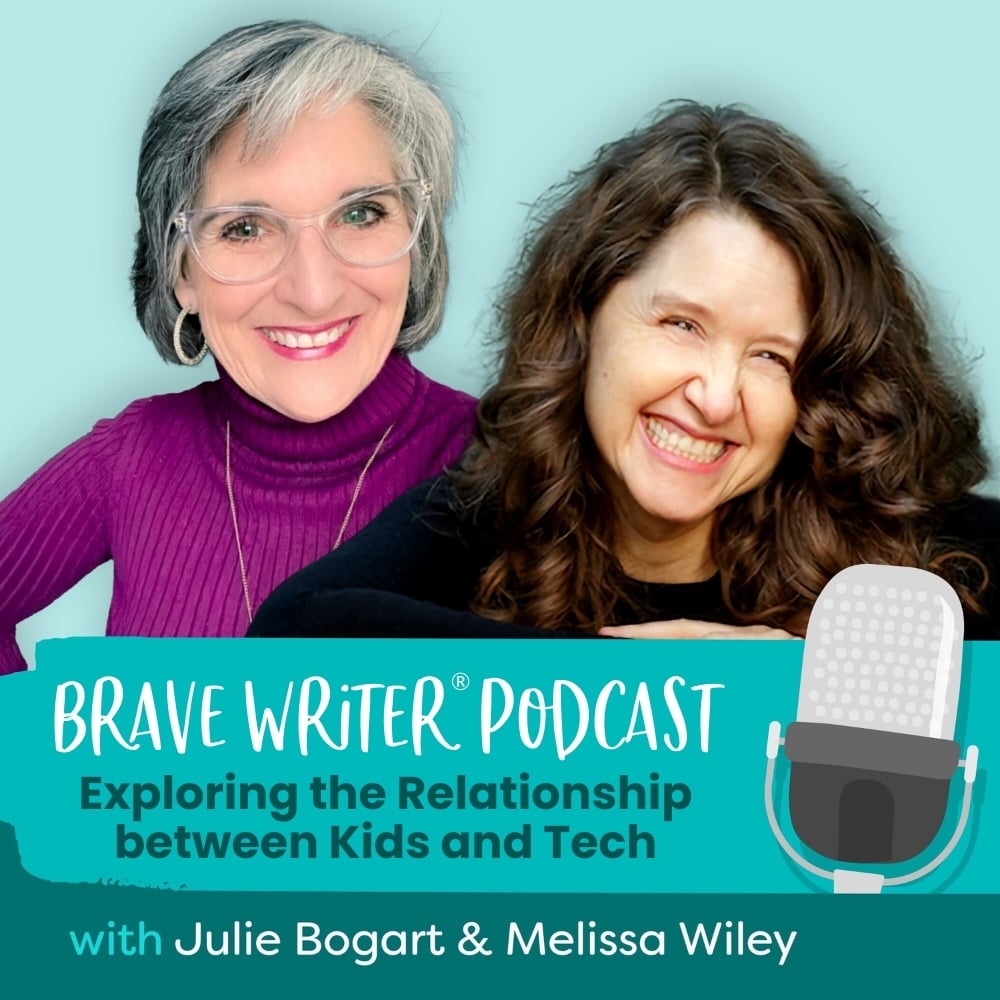[Podcast # 283] Exploring the Relationship between Kids and Tech with Ash Brandin

Do you feel overwhelmed navigating screens, gaming, and tech in your home? You’re not alone.
In this Braver Writer podcast episode, we explore how to shift from blame to curiosity when it comes to your child’s digital life. Ash Brandin, a middle school teacher and the voice behind The Gamer Educator, joins us to talk about the real reasons kids love screens—and how we can use those insights to build stronger connections and more balanced relationships with technology.
We discuss:
- the root causes behind tech reliance,
- how to help kids develop digital literacy,
- and why empathy and structure matter more than screen limits alone.
Tune in for a refreshing, realistic take on managing tech in a way that benefits the whole family.
Show Notes
There’s no denying it—technology is embedded in our lives and in our homes. From smartphones to video games, the digital world is not just something our kids use; it’s something they live in. Yet many parents still carry anxiety about how screen time affects childhood, learning, and relationships.
We believe it’s time to shift the conversation.
Rather than defaulting to fear, what if we asked more curious questions about the role of tech in our families? We’re not talking about blindly embracing every app and device, but rather acknowledging that screens are often used to meet real needs—by both kids and adults.
A child watching TV while a parent cooks dinner is not a failure of parenting; it’s a reflection of the lack of community support many families experience today. In past generations, neighbors helped one another, kids played outside in groups, and caregiving was more shared. Today, screens often serve as the stopgap where community used to be. Recognizing that can reduce guilt and open up more thoughtful decision-making around screen use.
It’s also helpful to consider what kids are actually getting out of their digital experiences. Games like Minecraft or Fortnite can offer more than entertainment—they can foster:
- creativity,
- problem-solving,
- social interaction,
- and perseverance.
These games represent risk, autonomy, and challenge—the very qualities we often admire in real-life activities like sports, crafts, or science experiments.
Instead of asking only, “How do I get my child off the screen?” we might start asking, “What is it about this experience that’s engaging them so deeply? And how can I offer something similarly fulfilling in the real world?” When we understand that screens can represent freedom, control, and accomplishment, we’re better equipped to offer off-screen experiences that provide those same feelings.
We also benefit when we stop seeing ourselves in opposition to technology and start seeing ourselves as guides. If we treat a child’s love of tech as something shameful or shallow, they will stop sharing those interests with us. But if we take the time to ask about the game they’re playing, or the video they’re watching, we get a window into their thinking—and a chance to connect.
That connection is vital when big feelings surface. A child melting down after losing a game isn’t just being “dramatic”—they’re processing disappointment and frustration. These are moments to help kids name their emotions, step back, and develop strategies for self-regulation—skills they’ll use far beyond the screen.
Technology is not going away. Our role is to prepare our kids to meet it with wisdom, resilience, and a sense of agency. We do that by building trust, staying curious, and treating their digital world with the same care we treat every other part of their development.
Screens are not the enemy. Disconnection is.
Resources
- Follow Ash Brandin on Instagram: @thegamereducator
- Purchase Julie’s new book, Help! My Kid Hates Writing!
- Check out Julie’s new author website: juliebogartwriter.com
- Subscribe to Julie’s Substack newsletters: Brave Learning with Julie Bogart and Julie Off Topic
- Try out our Brave Writer Practice Pages
- Learn more about the Brave Writer Literature & Mechanics programs
- Read all Brave Writer class descriptions
- Start a free trial of CTCmath.com to try the math program that’s sure to grab and keep your child’s attention
- Sign up for our Text Message Pod Ring to get podcast updates and more!
- Send us podcast topic ideas by texting us: +1 (833) 947-3684
Connect with Julie
- Instagram: @juliebogartwriter
- Threads: @juliebogartwriter
- Bluesky: @bravewriter.com
- Facebook: facebook.com/bravewriter
Connect with Melissa
- Website: melissawiley.com
- Substack: melissawiley.substack.com
- Instagram: @melissawileybooks
- Bluesky: @melissawiley.bsky.social
Produced by NOVA



















